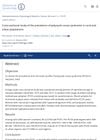Evaluation of Prevalence of PCOS and Associated Depression, Nutrition, and Family History: A Questionnaire-Based Assessment
July 2022
in “
PubMed
”

TLDR Many young women have Polycystic Ovarian Syndrome (PCOS), which is often linked with irregular periods, depression, low self-esteem, and insomnia. Lifestyle and diet changes, along with regular counseling, can help manage these symptoms.
The study "Evaluation of Prevalence of PCOS and Associated Depression, Nutrition, and Family History: A Questionnaire-based Assessment" involved 972 females, with a mean age of 24.37 years. The study found a high prevalence of Polycystic Ovarian Syndrome (PCOS) in the young female population. PCOS symptoms include infertility, amenorrhea, hirsutism, obesity, and androgenic alopecia. The study also found that a significant proportion of the participants reported irregular menstrual cycles (29.73%), depression (29.11%), low self-esteem (24.90%), and insomnia (22.94%). A higher proportion of females were diabetic (3.29% vs. 1.42%) and non-vegetarian (28.40% vs. 16.86%). There was no difference in the consumption of processed/fast food, carbonated drinks, and lifestyle. A significantly higher proportion of females had a positive family history of PCOS (13.17% vs. 3.68%). The study concluded that identifying at-risk individuals and imparting lifestyle and nutrition-based modifications could be beneficial. Regular counseling sessions might help tackle depression, leading to better overall physical and mental health.





